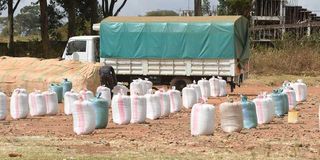Farmers in the soup as imported maize lands

Sacks of dry maize outside Kipchoge Keino Stadium in Eldoret town, Uasin Gishu County on January 23, 2023. Farmers are selling a 90 kilograms of the produce at between Sh4,600 and Sh4,800.
Uncertainty looms in the cereals sector as 10 million bags of imported duty-free maize are expected to hit the market next week.
The maize will land even as farmers in the North Rift region, the country’s food basket, are holding stocks worth millions from last season’s crop.
The Agriculture Ministry yesterday maintained that the 900,000 tonnes or 10 million bags of maize will be released to the market as planned to check the acute shortage of the staple to the relief of consumers who have been grappling with the high cost of flour.
Mr Kello Harsama, the principal secretary in the State Department for Crop Development, said licensed traders are expected to bring in the maize to enable the country to have sufficient stocks and contain shortages caused by declined yield due to drought.
“The release of duty-free maize will go on as planned to fill the deficit of the produce in the market,” said Mr Harsama on phone.
The Ministry of Agriculture has allowed traders to import 900,000 tonnes of duty-free white maize and 600,000 tonnes of duty-free milled maize from next month (February) to August this year.
“(This will) enable the country to have adequate stocks to last until the next harvest from July to August 2023. The duty waiver shall apply to white maize and milled rice imported into the country by August 6, 2023, by millers and traders,” said the State Department for Crop Development in a notice.
President William Ruto had earlier asked maize farmers to sell the produce at the current price of above Sh5,000 per 90-kilogramme bag ahead of the import of duty-free maize and rice from February.
But Mr Harsama yesterday asked licensed traders to bring in the maize to ease the shortage of the staple as more than 3.5 million Kenyans face starvation due to acute food shortage caused by drought-induced crop failure.
“There was a severe drought last planting season that resulted in a low yield and the release of the imported duty-free maize will go on to meet the shortage,” explained Mr Harsama.
National shortage
According to the National Drought Management Authority (NDMA), 31 counties are faced with food shortages and are in need of relief supplies.
The country produces an average of 30-40 million bags annually, with a deficit of about 10 million bags being sourced from the regional market — EAC and Comesa countries.
Maize production in 2020 stood at 42.1 million bags, down from 44 million in 2019. The country’s maize flour production over the last five years has averaged 2.8 million tonnes annually.
According to the Kenya National Bureau of Statistics, Kenya has imported an average of 295,092 tonnes of maize annually over the past five years.
According to annual agriculture reports, yields in the Rift Valley have been on a declining trend, with production dropping from 27 million bags to 21 million last season.
Harvesting of maize is still ongoing in parts of the North Rift region, with the country projected to realise 30 million bags against an annual consumption of approximately 45 million bags.
Uasin Gishu County is projected to harvest about 4.5 million bags of maize from last season’s crop, out of which more than 2.5 million bags will be released to the market.
Trans Nzoia County realised an estimated 5.3 million bags of maize while it consumes about two million bags, with an estimated 3.3 million being released to the market.
“We have sufficient maize stocks following bumper harvest this season and measures have been put in place to minimise post-harvest losses,” said Phanice Khatundi, the county executive in charge of agriculture, in an earlier interview.
Farmers' exploitation
She decried the exploitation of farmers by middlemen who have flocked to the area to purchase the produce at throwaway prices amid fears of the release of duty-free maize.
“Some of the farmers are still harvesting the crop and there is a need to protect them from exploitation from middlemen,” said Ms Katundi.
Maize farmers in the North Rift region – the country’s food basket – are in panic selling to avert possible losses as the imported maize is expected to hit local markets from next week.
The prices have dropped from Sh5,800 to Sh4,800 as some of the disillusioned farmers release thousands of bags of grains to the market.
The cost of maize flour has declined from Sh2,080 to Sh1,950 at the factory level to the relief of consumers who have been grappling with the high costs of flour.
The panic-selling of maize has exposed farmers to fraudsters who have swindled them of the produce. The opportunistic traders have flocked markets to purchase the grains using bouncing cheques while others buy the produce on credit but suddenly close shop before making the payments, subjecting farmers to huge losses.
Local leaders led by Uasin Gishu Governor Jonathan Bii cautioned farmers to be wary of the fraudsters and release the produce after they have received payments.
“Many farmers have been subjected to mental anguish by unscrupulous traders who have conned them of produce worth millions. Some of these fraudsters issue farmers with bouncing cheques while others disappear with the produce not to be traced, an issue we will not accept,” said the administrator.
Farmers have petitioned the government to extend the suspension on the importation, saying they are about to suffer losses.





